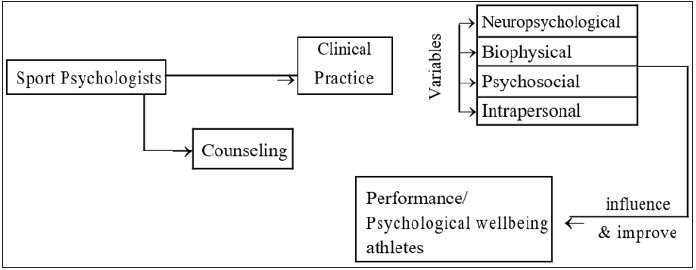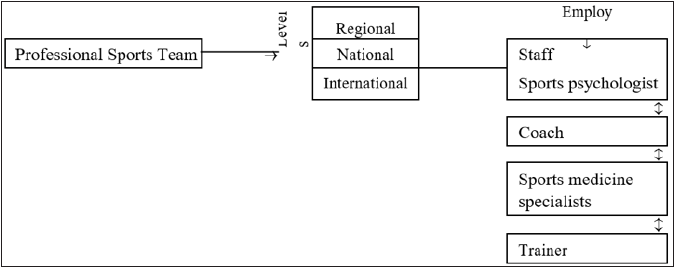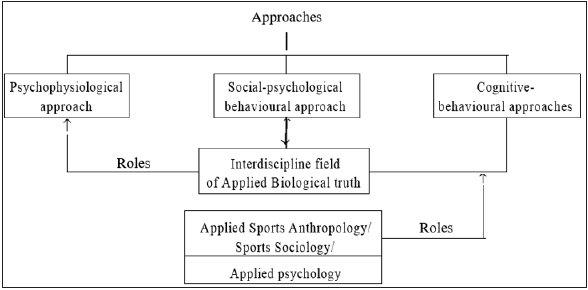- Submissions

Full Text
Research & Investigations in Sports Medicine
Sport Psychology: Issues and Importance- An Anthropological Overview
Abhijit Das*
Department of Anthropology, West Bengal State University, India
*Corresponding author: Abhijit Das, Associate Professor, Department of Anthropology, West Bengal State University, Barasat, Kolkata-700 126, India
Submission: February 19, 2021;Published: March 22, 2021

ISSN: 2577-1914 Volume7 Issue4
Preamble
According to the anthropologist’s games and sports are basically recreational patterns of culture in society. As the sporting events always need specific health and mind, sports are bio-cultural issue, too. Every performance in the specific sport event requires the preparation of health and mind, both have a psychological basis. It is worth mentioning that myths and superstitious about sport performance almost always have a psychological issue. There are lots of examples support this inseparable truth. A male player would not share until his team loses. A coach wears the same shirt to all games. Sports announcers and sports commentators of the attribute changes in competitive performance to some psychological factors. Often pregame orations by coaches are said to psych up a team. Thus, Sport Psychology is the sport science that seems most to intrigue the average sport enthusiast [1].
The fact that superstitious practices such as the owes described still abound is the best evidence that too little is known about the psychological aspects of sport competition. Although sport psychology has become an active academic as well as research field in the past 50 years and has made important studies as a clinical field working directly with coaches and players/athletes, its findings have not become well known among the general public. Both lay persons and professionals in physical education and sports science have long been interested in dealing with the facts to psyche up players or teams, participation of high-risk sports, different personalities attached with different sports, coping with competitive stress, aggressiveness for some specific sports, like wrestling, boxing, etc. Most coaches and players/athletes who work and compete in sport have long believed the psychological aspects of performance are often as important as, or more important than, the physical/physiological aspects of performance. It is, therefore, no surprise that as the discipline of physical education and sports science emerged in the 1960s, sport psychology developed and grew as one of its most popular and significant subdisciplines as well as an area of academic understanding. Therefore, beside the primary involvements in relations around sports, sport psychologists are associated with sports events as secondary involvements in professional sports.
secondary involvements in professional sports.
Figure 1:Sport psychology- major subject.

In recent years, a growing number of sport psychologists are in their clinical practice (applied domain of sport psychology) The clinical sport psychologist utilizes psychological interventions to improve the performance. The following diagram depicts the role briefly [2]; (Figures 2 & 3).
Figure 2: Role of clinical sports psychologists.

Figure 3: Importance of employing sports psychologist in professional sports.

Approaches
Generally, three approaches have been applied to sport and exercise psychology [3]; (Figure 4). The psychophysiological approach is based on the belief that physiological processes of the brain and body provide the prime or key understanding performance and physical activity in Sports. The researcher from applied physiology and applied biologic anthropology written this approach monitor physiological processes of players/athletes like, heart rate, blood pressure, muscle tension, etc. They also examine how control of these factors may improve sporting performance.
Figure 4: Ipproaches of sports psychology and anthropological roles.

The social-psychological or behavioral approach focus upon
the interaction of the individual participant and the broader
environment in which sport takes place (e.g., relations with
coaches, teammates, etc.). This can be done intensively through the
‘participant observation’ by the anthropologist. Anthropologists
also can study those relations among the primary participants
in sport events, through ‘case studies’ intensive interviews, etc.
Researchers within this perspective particularly focus on the
potential to change Behaviour through reinforcement (reward of
desirable Behaviour, etc.).
The cognitive-behavioral approach emphasizes the control of
the performer’s thoughts and emotions as the primary means by
which, to alter behavior researchers from cognitive anthropologies
too, in their application, seek to influence the way a player/an
athletic interprets events round him/her [4].
Conclusion
Thus, the mental aspects of sports personalities as depicted from the sport psychological issues and approaches are developed day by day in present day. Sports wilieu the holistic applications of sport psychology, sports anthropology, sport sociology and sport science in this interdisciplinary field will give a total development of players/athletes in different sports events. These applications will be very much relevant in the press sports under pandemic episode due to COVID-19, too.
References
- Seidentop D (1994) Introduction to physical education, fitness and sports. Mayfield Publishing Company, London, UK.
- Garret WE, Kirkeudall DT, Squire DL (2001) Principles and practice of primary care sports medicine. Lippincott Williams & Wilkins, New York, USA.
- Malcom D (2008) The sage dictionary of sports studies. Sage Publications Ltd, London, UK.
- Besnier NS, Browell TP, Carter (2018) The anthropology of sport. University of California Press, California, USA.
© 2021 Abhijit Das. This is an open access article distributed under the terms of the Creative Commons Attribution License , which permits unrestricted use, distribution, and build upon your work non-commercially.
 a Creative Commons Attribution 4.0 International License. Based on a work at www.crimsonpublishers.com.
Best viewed in
a Creative Commons Attribution 4.0 International License. Based on a work at www.crimsonpublishers.com.
Best viewed in 







.jpg)






























 Editorial Board Registrations
Editorial Board Registrations Submit your Article
Submit your Article Refer a Friend
Refer a Friend Advertise With Us
Advertise With Us
.jpg)






.jpg)














.bmp)
.jpg)
.png)
.jpg)










.jpg)






.png)

.png)



.png)






